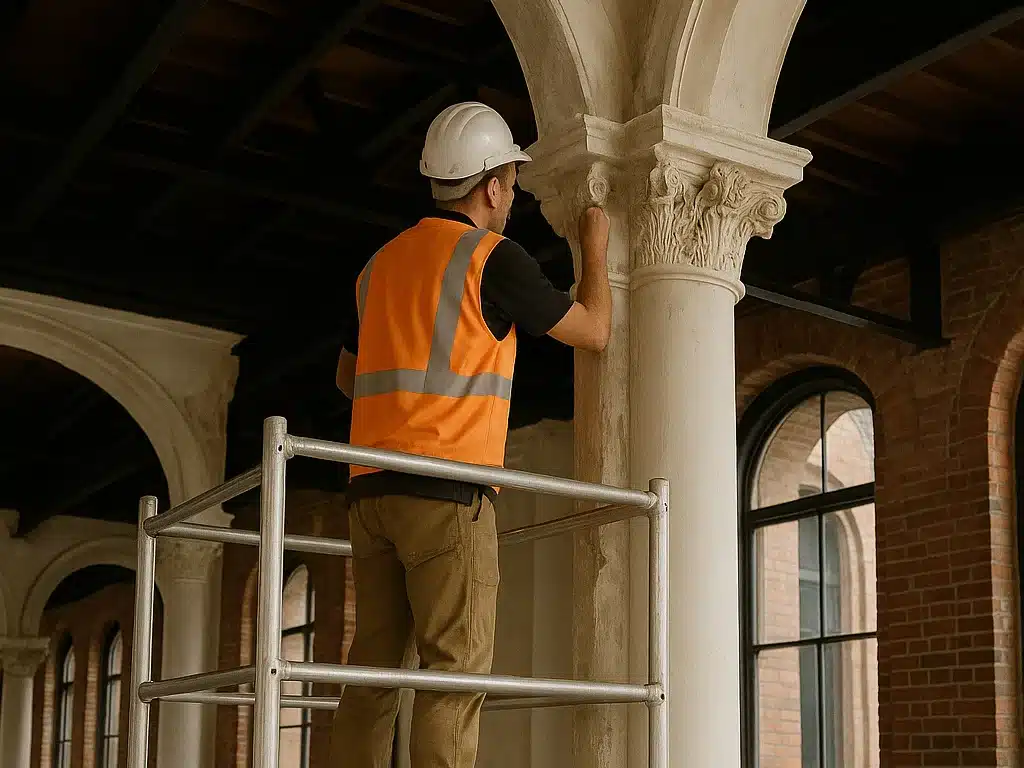July 2025
By Christopher Watt, Managing Director – IDB (Interior DB Limited)
If you’re planning a commercial fit-out or building upgrade in Auckland one of the first questions you and the Design Team will face is – do I need a Building Consent for the work?
It’s an important question that, if mis-interpreted can lead to costly delays, fines, or even having to undo completed work. At IDB, we’ve helped many clients navigate this space, and in this post I’ll walk you through:
- When a Building Consent is required
- The common triggers that apply to commercial fit-outs
- What a Consent Exemption is — and how it might help your project
When is a Building Consent Required?
In New Zealand, the Building Act 2004 sets out when a Building Consent is needed. In simple terms a Building Consent is required for any work that affects the structure, fire safety, or sanitation of a building. This applies to both Commercial and Residential buildings, but for Commercial spaces (like offices, retail, hospitality, and medical premises), there are extra layers — especially around fire safety, accessibility, and compliance with Change of Use or Specified Systems.
Common Triggers for Building Consent in Commercial Fit-Outs / Building Upgrades
Based on our experience, these are the most common elements of a commercial fit-out that require a Consent:
Changes to Plumbing or Drainage
- Adding new bathrooms, kitchens, or relocating sinks that are strictly not ‘like for like replacement’
- Any work affecting wastewater systems especially new connections
Fire Safety Upgrades or Alterations
- Moving or adding fire-rated walls, doors, or ceilings
- Changes to smoke detectors, sprinklers, alarms, or egress paths
Structural Modifications
- Cutting penetrations through slabs, beams, or load-bearing walls
- Adding mezzanines or internal staircases
Modifications to Specified Systems
- These include systems like fire alarms, mechanical ventilation (HVAC) & emergency lighting
- Any changes to how these systems operate usually require both Consent and amended Compliance Schedules
Accessibility Changes
- If you’re altering access routes, entrances, bathrooms, or circulation spaces in a way that affects accessibility, consent may be required under NZBC Clause D1 (Access Routes)
Change of Use
- If you’re turning a retail space into a medical clinic, or a warehouse into offices, this usually triggers a full Building Consent, even if the physical work seems minor
What is a Consent Exemption?
Not all work requires a Building Consent — and this is where Consent Exemptions apply. An exemption is essentially formal confirmation from the Council that your proposed work falls outside the requirements for a Consent even though building work is being undertake to a site that could be significant in nature eg – fitting out an entire floor of a building.
It’s important to note you cannot decide whether a Building Consent is required on your own — the exemption must be approved in writing by the Council, usually under Schedule 1 of the Building Act.
At IDB, in close consultation with a Designer, regularly prepare and submit exemption applications for clients — especially for things like:
- Minor alterations to layout that don’t affect specified systems
- ‘Like for like’ replacement of bathrooms / Kitchens
- Fit outs where the status of the fire system does not change. An up to date Fire Report is usually required in this instance
- Heritage Building work can be consent exempt for example where affected surfaces are not being modified / affected and the fire systems are remaining as existing with partitions that are technically not full height / demountable.
When a Building Consent is not required
A Building Consent is usually not required when the proposed work does not affect the building’s structure, fire safety systems, plumbing, or specified systems. For example, installing non-loadbearing partition walls, replacing ceiling grid & tiles, stopping & painting, laying carpet / vinyl / tiles, replacement of lighting, ageing wall mounted AC Units, Sanitaryware or updating joinery typically does not require consent. However, even for minor work, it’s important to confirm with IDB in consultation with the council as commercial buildings have additional compliance requirements.
What Happens If You Build Without Consent?
If building work is completed without a Consent, the consequences can be serious:
- Fines or stop work notices
- Problems obtaining Code Compliance Certificate (CCC)
- Retroactive Building Consent application with close scrutiny by Council
- Delays / problems when leasing, selling, or insuring the premises
- Potential liability for non-compliant or unsafe work
- Unforeseen Capex expenditure to make work compliant
Our Advice? Get Building Consent Status Checked Early
At IDB, we start every project by asking the right questions. We build a picture of recent work in the building, who was involved, and what documents are available for review. The following questions are always raised at the first Client / Design Meeting:
- Clear definition of project scope
- Does the project involve structural changes, fire safety, or plumbing?
- Will it affect the use or legal compliance of the space?
- Are specified systems being altered?
- Do we need a fire report or accessibility assessment?
- Does the building carry some sort of Heritage Status & what are the Consent implications?
- Is there already a Building Consent for work in the building. Can the proposed work possibly fall under that Consent?
- What information is contained in the Building File?
- Does the Building have a current BWOF?
- What is the status of the most recent Fire Report for the structure?
- What Designers have worked in the building recently?
If there’s any doubt, we engage with council early utilizing a Designer / Building Consultant to confirm the best path forward — whether that’s a full building consent, a consent exemption or in some cases no consent at all.
Final Thoughts
Building Consent requirements aren’t always black and white especially in the commercial sector. The layering of different Building Codes / Statutes leaves the final requirement open to interpretation. By engaging with IDB early on it will help you manage timelines, the budget, and long-term compliance risk. At IDB, we don’t leave this to chance. We work closely with Designers & consultants and council to ensure that your commercial fit-out proceeds smoothly, with all the right approvals in place prior to the work commencing on site.
Do you need help navigating the Building Consent process?
We’d be happy to advise. Contact Christoper at 027 538 2037 or at www.interiordb.co.nz and let’s talk about your next project.

IDB was founded in 2020 by Christopher Watt who brings over 25 years of international experience in the commercial & residential sectors. Having worked extensively as both a Quantity Surveyor and Project Manager on high-end construction projects across the UK, Europe, and Asia, Christopher returned to New Zealand in 2014 to settle and raise a family.

